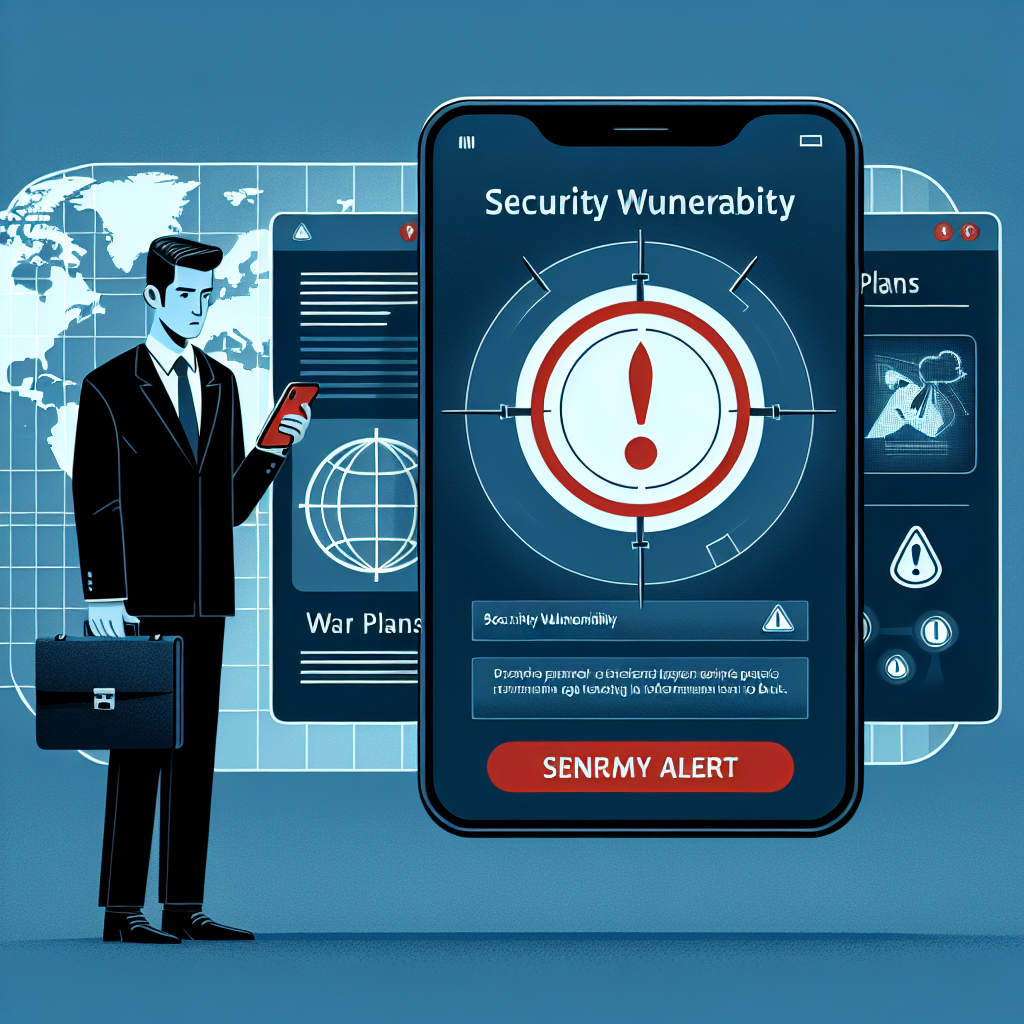iPhone Autocorrect Glitch Reveals U.S. Military Strategies: What Occurred and Its Implications for National Security
In an era dominated by digital technology, where smartphones serve as our personal assistants, financial tools, and communication centers, even trivial mistakes can lead to significant repercussions. This reality was starkly illustrated when a basic iPhone function inadvertently exposed highly classified U.S. military war strategies. The situation has sparked critical concerns regarding cybersecurity, digital communication standards, and the dependency of government entities on consumer-level technology.
How an iPhone Feature Triggered a Security Breach
The Incident
On March 13, National Security Advisor Mike Waltz inadvertently included journalist Jeffrey Goldberg in a private Signal conversation. The conversation, labeled “Houthi PC small group,” was intended for a select group of White House advisors to deliberate on a tactical military action against the Houthi insurgents in Yemen.
The blunder arose when Waltz’s iPhone proposed a “smart” contact update for Brian Hughes, the actual intended recipient. Instead of refreshing Hughes’ contact details, the iPhone replaced them with Goldberg’s number—likely due to a past interaction or similarities in the contacts. Trusting this suggestion, Waltz mistakenly sent the Signal invitation to the incorrect individual.
Why It Matters
Goldberg, editor of The Atlantic, later reported on the chat’s contents, inadvertently exposing not only the group’s existence but also the administration’s dependence on the Signal application for sensitive military discussions. While not all details were published, this exposure has ignited a conversation about digital security practices at the highest levels of governance.
The Role of Signal in Government Communications
Signal’s Appeal for Secure Messaging
Signal is widely acknowledged as one of the most secure messaging applications available to the public. It features end-to-end encryption, disappearing messages, and stringent data retention policies. These attributes make it appealing not only to privacy-conscious individuals but also to government officials in search of reliable communication methods.
Government Reliance on Consumer Apps
This incident also draws attention to a pressing issue: the U.S. government currently lacks a secure messaging system that is sufficiently robust to supplant commercial options like Signal. Consequently, officials frequently resort to these applications for high-stakes discussions, despite the potential dangers linked with using consumer-grade tools in national security scenarios.
The Risks of Over-Reliance on Smartphones
iPhone Contact Suggestions: Convenience or Danger?
Apple’s iPhones are celebrated for their user-friendly functionalities, such as suggested contact updates and intelligent autocorrect. However, this incident highlights the inherent risks of uncritically accepting automated suggestions—especially in professional contexts where the implications are significant.
The iPhone’s capability to propose contact updates based on prior interactions or shared details can be immensely beneficial. Yet, when applied in sensitive situations without confirmation, it becomes a considerable security hazard.
Not Just an Apple Problem
While this specific incident involved an iPhone, the issue reflects broader challenges in our digital landscape. Smartphones of all brands are increasingly woven into our personal and professional lives, often obscuring the distinction between convenience and risk.
Takeaways for Government and Corporate Security
Need for Dedicated Secure Platforms
This occurrence serves as a reminder for government agencies to prioritize the creation or acquisition of their own secure communication platforms. Relying on third-party applications, regardless of their claims of security, introduces risks that could be alleviated through purpose-built systems.
Training and Awareness
Cybersecurity extends beyond technological solutions—it fundamentally involves people. Government officials and corporate leaders must engage in regular training to comprehend the risks associated with digital communication tools. Simple procedures such as confirming contact information prior to sending sensitive data could avert significant breaches.
Conclusion
The inadvertent exposure of military strategies due to an iPhone’s contact suggestion capability is a vivid illustration of the vulnerabilities that accompany contemporary communication tools. Although applications like Signal offer strong encryption and privacy options, they cannot replace secure, government-controlled communication systems. As technology progresses, so too must our strategies for cybersecurity—particularly within the highest tiers of government.
Frequently Asked Questions (FAQs)
What exactly happened in the iPhone security incident?
National Security Advisor Mike Waltz mistakenly sent a Signal chat invitation to journalist Jeffrey Goldberg instead of the intended recipient, Brian Hughes. The error stemmed from an iPhone contact suggestion malfunction.
What is Signal, and why does the government use it?
Signal is a secure messaging app recognized for its end-to-end encryption and privacy-centric features. The U.S. government employs it due to the absence of a dedicated, equally secure internal messaging platform.
Was any classified information leaked?
While full details of the military strategies were not disclosed, the presence of the chat and its topic—strategic discussions regarding a strike against the Houthis in Yemen—were revealed, which may represent a substantial breach.
Can smartphone features like contact suggestions be turned off?
Yes, most smartphones let users manage or disable features like contact suggestions and smart updates within the settings. It is recommended for users handling sensitive information to turn off such features.
Is this just an Apple issue?
No, the issue is not limited to Apple devices. All smartphones equipped with smart contact management capabilities present similar risks. However, this specific incident did involve an iPhone.
What are the broader implications for national security?
The incident highlights the immediate need for improved digital communication infrastructure within the government. It also underscores the significance of cybersecurity training and verification processes for officials.
How can I protect my own communications?
For personal security, consider using secure messaging applications like Signal, and exercise caution with smart features like contact suggestions. Furthermore, always verify recipient information when transmitting sensitive messages. If you’re using headphones or earbuds, ensure they are secure and appropriate for your needs, particularly in professional settings.